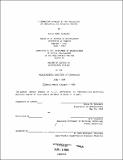A normative approach to the evaluation of industrialized building systems
Author(s)
Alhasani, Nadia Mehdi
DownloadFull printable version (5.265Mb)
Alternative title
Industrialized building systems, A normative approach to the evaluation of
Other Contributors
Massachusetts Institute of Technology. Dept. of Architecture.
Advisor
Eric Dluhosch.
Terms of use
Metadata
Show full item recordAbstract
The rapid development of the building industry within the last 10-15 years involved the adaptation of a more. specialized and advanced system of construction and management. And, with the expanding alternatives of industrialized building systems developed and being developed in Europe and North America, the task of decision-making concerning the choice of the most appropriate system as a solution to a specific problem confronting us, becomes more of a burden on the decision-maker(s) than ever before. Intuition, a non-quantitative means of judgment, cannot be solely depended upon for complex decision-making. Thus, quantitative scientific evaluation methods become more of an appropriate tool to do so. One approach to dealing with this subject is the systems approach, focusing on systems as related to the processes of building, industrialization and evaluation. This, in a sense, exposes the notion of "systems" as a dynamic tool in the planning of complex procedures. Understanding the theories of evaluation, weighing and aggregation, becomes crucial in order to comprehend and determine the parameters required for the problem to be evaluated. On the one hand, we will explore the major factors directly related to the planning and generation of a building industry within a specified context. Such factors as the local market, resources and organization are considered to be among the most sensitive when weighing their importance and feasibility to a proposal. One the other hand, user's requirements and performance specifications are two aspects that a building system's typology (hardware) is based upon. It is adopted, in this case, as a rational approach to a more comprehensive method of selection.
Description
Thesis (M.S.)--Massachusetts Institute of Technology, Dept. of Architecture, 1984. MICROFICHE COPY AVAILABLE IN ARCHIVES AND ROTCH Includes bibliographical references (leaves 122-126).
Date issued
1984Department
Massachusetts Institute of Technology. Department of ArchitecturePublisher
Massachusetts Institute of Technology
Keywords
Architecture.